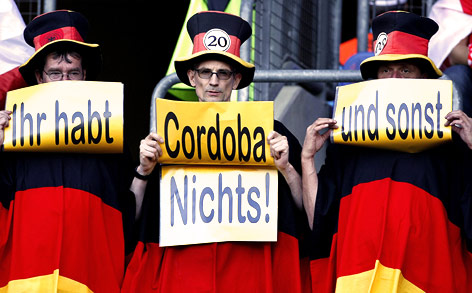1978. Defending World Cup champions, the West Germans, faced up against the Austrian National soccer team. At home, the German team had shelves creaking and bending under the weight of so many trophies: 1st place in 1954, 4th place in 1958, 2nd place in 1966, and 3rd place in 1970. The Austrian team, on the other hand, had 1 third place win in 1954, and that's pretty much it. The odds were not in their favor to be sure.
But in spite all of that, deep in the heart of Argentina in a city called Cordoba, Austria toppled the West German soccer powerhouse 3 to 2.
 Apparently, the Germans and the Austrians are STILL talking about it. Given the history of the 20th century, my students are often intrigued by the idea of rivalry, competition, or contention between the D-A-CH countries. It wasn't until I sat in on the lecture during my summer seminar given to us about immigration in Austria, that I gained any insight into this cultural perspective. It all comes down to one thing: sports.
Apparently, the Germans and the Austrians are STILL talking about it. Given the history of the 20th century, my students are often intrigued by the idea of rivalry, competition, or contention between the D-A-CH countries. It wasn't until I sat in on the lecture during my summer seminar given to us about immigration in Austria, that I gained any insight into this cultural perspective. It all comes down to one thing: sports. 
Since I was finishing up a chapter about hobbies and sports, I thought that I could work in a small bit about this rivalry between Austria and Germany. I shared the story with the students about the 1978 game. We looked at vocabulary like das Wunder von Cordoba, die Schande von Cordoba, immer, schlagen, and Mannschaft. And to ensure that I was presenting a balanced view on the story, I showed this image of current t-shirt, so that we could include Switzerland in the discussion.
Interestingly, t-shirts provide excellent authentic text for beginning to intermediate language learners. They are short, sweet, often funny, and intensely contextualized.
A few days following this lesson, a student came up to me after class and shared that while playing on a German server for an online game the previous night, he got into a discussion with a German with whom he was playing, who was a fervent soccer fan. My student ribbed him with his knowledge of the loss at Cordoba. The German guy was less than thrilled and threatened to kick him out of the game that night! I'm sure he was joking, but my German 1 student had this proud sparkle in his eye that he had that little piece of cultural knowledge tucked up his sleeve. I couldn't help but smile from ear to ear as he shared his encounter. This is proof positive to me that teaching culture matters, and I'm not going to put it on the sidelines any longer.

Sports is definitely a boundary-crosser. I've seen old ladies and teenagers high-five over an (American) football game, and I've talked ice skating with an HVAC guy who used to work at a rink that saw such Olympic greats as Victor Petrenko, Oksana Baiul, and Brian Boitano. Great job on catching the interest of your students while they learn all along!
ReplyDelete